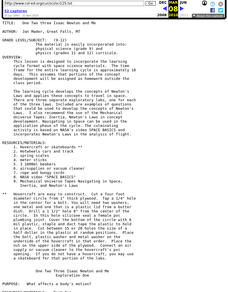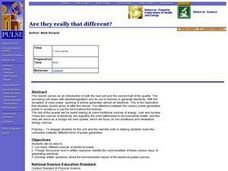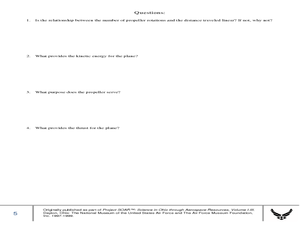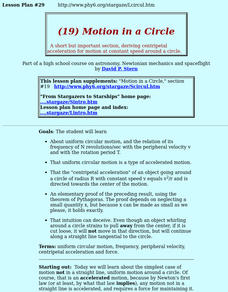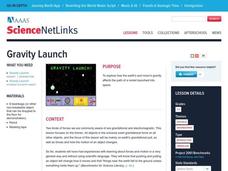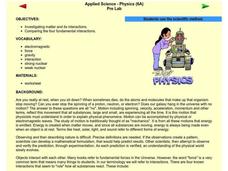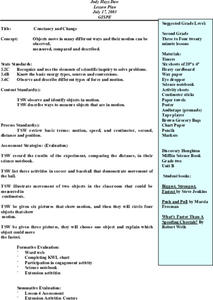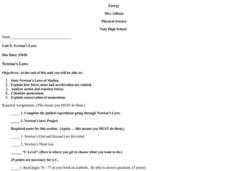Curated OER
What Makes Thing Fly?
Second graders study lift, drag and thrust from a real flight instructor. In this physical science lesson students build and fly paper airplanes and experiment with variations and design.
Virginia Department of Education
The Particle Theory of Matter
Demonstrate the particle theory of matter to high school scientists with an engaging experiment that allows them to visually see the results as substances change from one state to another. The class concludes with a discussion about how...
Curated OER
How Wind Works
Second graders investigate the process that creates wind. In this wind lesson plan, 2nd graders create a wind diagram. Students write an essay to accompany their diagram.
Curated OER
One, Two, Three--Isaac Newton and Me
High schoolers experiment to develop understanding of Newton's Laws and how they apply to space travel in this ten day instructional activity sequence.
Curated OER
Technology of the Deep: Experiments with Buoyant Forces
Young scholars conduct a series of experiments to study the effects of temperature and salinity on the buoyancy of an object in water. They devise ways to make floating and sinking objects neutrally buoyant.
Curated OER
Science: Generating Electricity
Eighth graders examine the various methods of generating electricity and explain their commonalities. They determine what is the most common source of energy and what are the potential environmental health hazards due to electrical...
Curated OER
Propellers, Forces and Energy
Students construct a model airplane, measure distance, and calculate velocity. For this creative lesson students work in groups to build a model and use it to calculate distances and velocity.
Curated OER
Avalanche!
Students explain that when forces on an object are balanced, the motion of object does not change. They describe how an object changes its motion when forces on it are unbalanced. They plan and conduct a scientific investigation to test...
Curated OER
Simple Harmonic Motion
Students explain the theory of simple harmonic motion (SHM) by performing hands-on, practical application experiments.
Curated OER
Motion in a Circle
Students explore uniform circular motion, and the relation of its frequency of N revolutions/sec with the peripheral velocity v and with the rotation period T. They examine how uniform circular motion is a type of accelerated motion.
Curated OER
Motion in a Circle
Students study about deriving centripetal acceleration for motion at constant speed around a circle.
Curated OER
Accelerated Frames of Reference: Inertial Forces
Students examine how when applying the laws of motion to an object in an accelerating frame, using coordinates defined in such frame, one must always add an "inertial force", representing forces caused by the frame's acceleration.
Curated OER
Pendulum Motion Experiments
Students experiment with simple pendulums to determine the validity of an equation for all angles. Students discover the usefulnes and limitations of approximations in science. Using spreadhseets and a java applet, students observe the...
Curated OER
Gravity Launch
Students examine how gravity affects launching rockets into space. In this physical science lesson, students review the concept of gravity and use an interactive online site, "Gravity Launch," to simulate a rocket launch.
Curated OER
Matter and Energy
Students explore energy by completing a science worksheet in class. For this principles of matter lesson, students define the vocabulary terms force, gravity, nuclear, and electromagnetic before reading assigned text about energy....
Curated OER
Vectors
Students describe motion by the use of adding vectors to obtain the resultant vector. They comprehend the meaning of a resultant vector. Students identify the difference between the x and y components of vector quantities. Students...
Curated OER
Rockets!!
Learners launch a rocket. In this laws of motion lesson, students discuss the forces of flight, how a plane flies and how a rocket gets off the ground. Learners watch a video about rocket launches, discuss Newton's Third Law...
Curated OER
Introduction to Friction
Students study the properties of the frictional force between two surfaces in contact. They inspect various phenomena in nature where friction plays an important role and demonstrate
Curated OER
Testing and Refining Aircraft Design
Young scholars design and make a flying device. They work in small groups to brainstorm ideas for the design of their device. They choose an idea or combination of ideas to use for their design and create a sketch of their design. The...
Curated OER
Constancy and Change
Second graders investigate how objects can move in different ways. They move in different ways across the room and develop a class list of movement words. Students also conduct a measuring motion experiment, create a bar graph for the...
Curated OER
A Classical & Relativistic Trip to a Black Hole
High schoolers calculate distance, velocity, acceleration and time on their fantasy trip to the black hold. They apply Newton's Laws of Motion and calculate circular motion. They discuss any questions that may arise.
Curated OER
Simple Machine Research
Fifth graders demonstrate the ability to use scientific skills and Processes to describe forces that act upon objects to cause specific changes in motion. They identify and describe a science problem related to forces and simple machines.
Curated OER
Simple Machines V - Wheels and Axles and Gears
Fourth graders investigate the principles and uses of gears, and examine how gears can be used to alter the direction of motion or the speed of an object. They observe two cars with different sized wheels roll down an inclined plane,...
Curated OER
Newton's Laws
Students state Newton's Laws of Motion. They explain how force, mass and acceleration are related. They analyze action and reaction forces, calculate momentum,
and explain conservation of momentum



